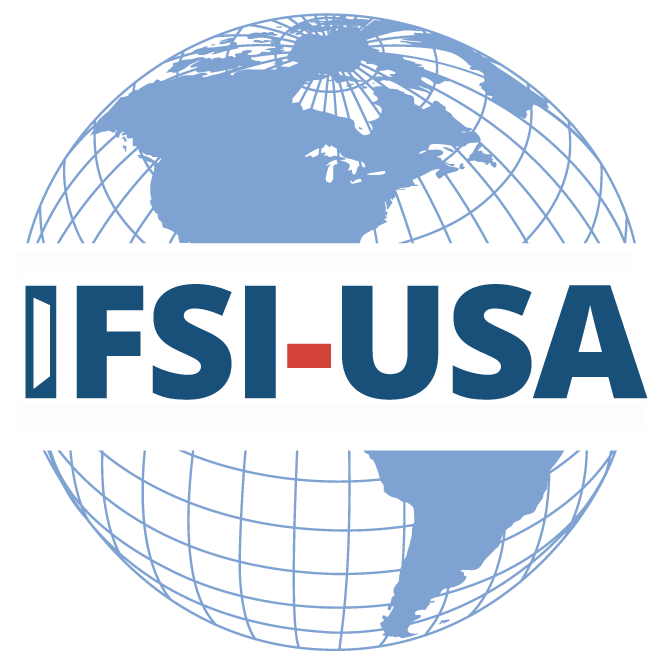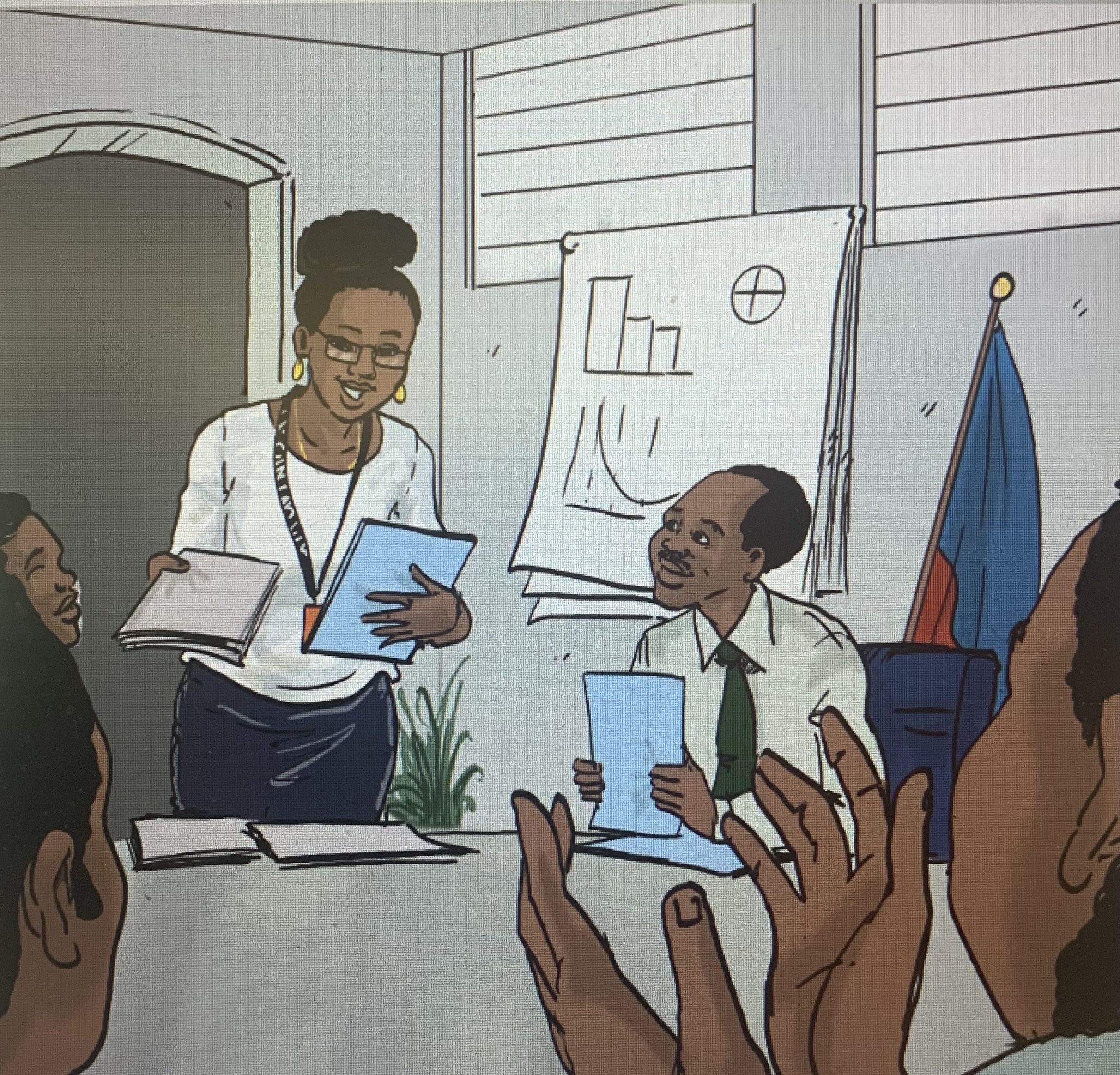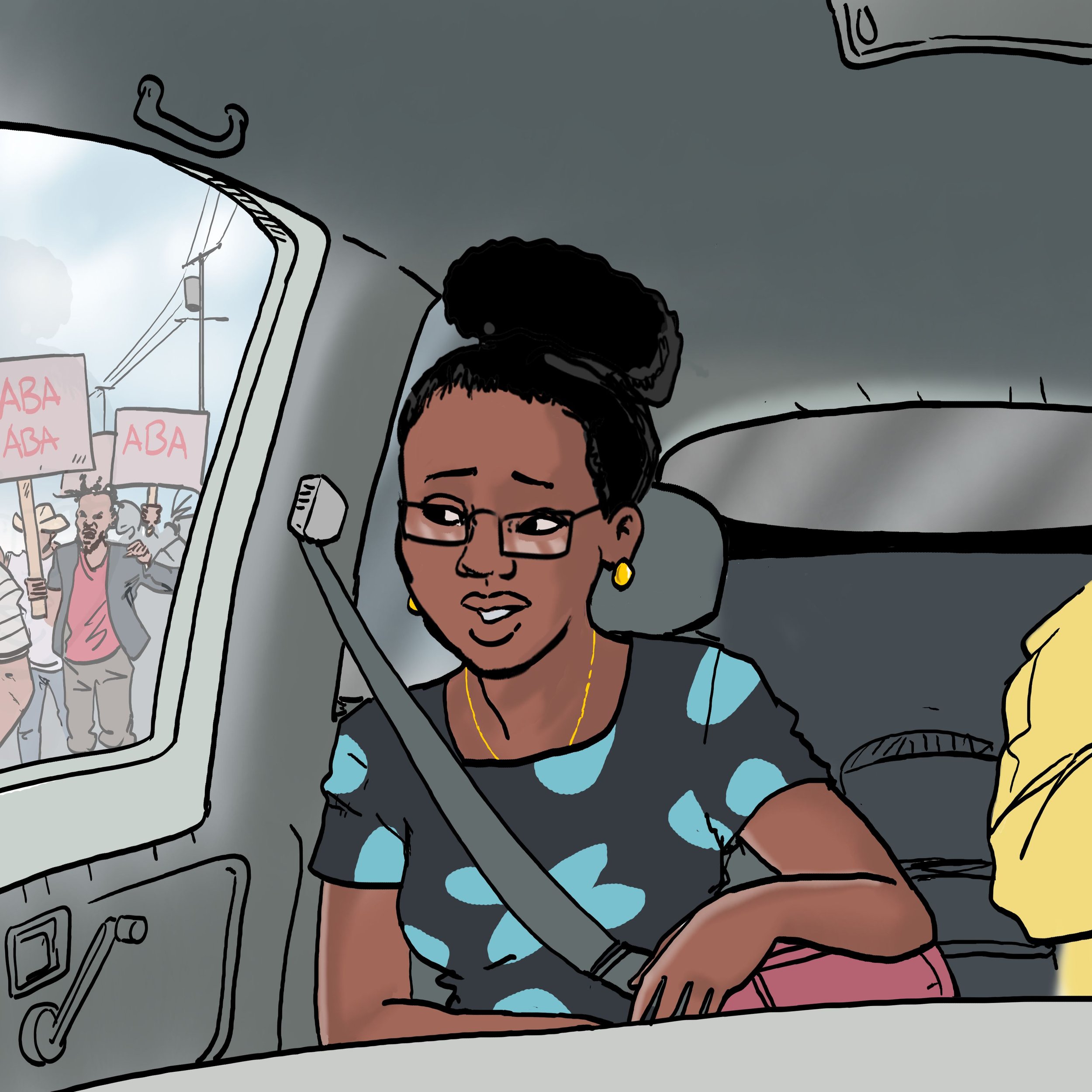She loves her country but had to leave it
Esther is a competent and aspiring young Human Resources professional seemingly with strong career prospects ahead of her in Haiti.
Esther never thought that one day she’d leave her beloved Haiti. Born in 1992 in Delmas, she grew up in Frères, a middle-class neighborhood, as a bright and confident young girl. She was always top of her class at a Christian congregational school. Her parents had high expectations and thought she could succeed in whatever field of work she chose. After High School, she studied to be a Bilingual Secretary at a prestigious institution and graduated with honors.
Soon after graduation, she found a position with a communications company. “I started as an Administrative Assistant in the human resources department,” she recalled. Over the years, she became a crucial player in the company handling payroll and insurance.
With her skills and work ethic, Esther envisioned one day becoming a CEO and a leader in her field. But first, thinking about starting a family, she married her boyfriend who worked as an accountant in an international organization. The young couple moved to a rental house in Delmas 75, a trendy neighborhood outside of Port-au-Prince.
Esther continued to grow at her job while continuing her education. She was earning a decent income but continued looking for better opportunities since she had outgrown her current position. Life was good; her future looked bright in her sun-bathed country. Her only concern was not being able to have a child even after trying for many years, but then finally in 2019 she got pregnant. While excited about becoming a mother, the country was grappling with violent protests characterized by the "Peyi lok” (locked country) phenomenon. During this period activities in the Capital came to a standstill. Those events caused so much stress that she developed high blood pressure and signs of a dangerous pregnancy-related condition called preeclampsia. Her gynecologist advised that she travel abroad to seek better prenatal care.
Increasing presence of criminal gangs in the capital make it necessary for Esther to commute to work in a hired car.
So, in October 2019 she took a leave from work and went to France, but returned after just one month. She reflected at the time, “I’d be a young mother perhaps stuck in France with no experience raising a child and illegal immigration status. How would I manage? So I returned to Haiti and was resigned to deliver my baby in either Haiti or the Dominican Republic." She was six months pregnant at this point.
Upon her return she found the political conditions in Haiti even worse which increased her stress level and chances of a miscarriage. Since returning to France was out of the question she wondered, should she try the United States? Esther decided on the US despite her excellent financial standing at home, but the American Consulate rejected her visitor visa application four times. Not wanting to experience another rejection she convinced herself she really didn’t need to travel to the US, but her husband convinced her to try once more.
She went to the American Embassy on December 2, 2019, and this time applied for a medical emergency visa. Based on her previous rejections she didn't have much hope. Nonetheless, before leaving the house she prayed alongside her husband and then was shocked when granted the visa.
In mid-December 2019 she traveled to the US alone and a few weeks later was blessed with a healthy baby boy. She could have stayed then in the States and sought resources to care for herself and the baby, but she still hoped the conditions would improve in Haiti where she always intended to live and raise her children. Homesick and missing her husband, she returned to Haiti with her boy in March 2020, right before the government closed the airport for Covid confinement.
After enjoying the warm feelings of the return home to loved ones, Esther realized that conditions in Haiti offered no hope of improvement. She could no longer commute safely to work due to the civil unrest so her company put a car and driver at her disposal. But a few months later her office closed and she had no incentive to stick around the growing political turmoil and personal persecution.
She then decided to return to the States permanently and without her husband. "If Haiti were even a little stable and offered a certain level of security, I would have never left," she confessed. "You leave your comfort zone coming to a country where you don't know what to expect."
Esther went first to Florida but found no support. "I had nobody there to help and coach me. The people around me were scared because I was an immigrant." Being unemployed was especially difficult for her because she was always active and working. She then went to Boston, where her in-laws lived. Life there was less challenging, but as she was still unemployed, she could not care well enough for her boy or herself.
As conditions in Port-au-Prince continued to deteriorate Esther obtained a US medical emergency visa for a dangerous pregnancy related condition. After a successful birth she applied for TPS and work permit seeing little hope for stability and job prospects in Haiti.
Uncomfortably relying on her in-laws for all her needs and comparing her current situation with her life in Haiti, she found herself on the brink of major depression. Consoled mainly by her young child she began searching for resources and it was then she learned about SNAP and Temporary Protective Status (TPS), for which she applied in September 2021. Later, a close friend of her in-laws helped her file for subsidized housing. Thus, after seven months living with her in-laws, she moved to an apartment in Brookline, MA.
Later, a woman, whom Esther had tutored in computer and English skills encouraged her to call IFSI. It took her some time before reaching out to the organization because she just didn't expect to find any tangible help there. But upon contacting IFSI she was surprised and impressed by the warm welcome. "To be frank, I regret not knowing about IFSI earlier," she confessed. She then attended an English class to improve her language proficiency while her child attended child care provided free of charge.
She was encouraged by how IFSI helps newly arrived migrants feel welcomed, connected to fellow Haitians and better integrate within the Boston community. Before contacting IFSI, she used to feel depressed, lost, and out of place. But little by little, she became more optimistic about the future. "It has been 2 years since I first arrived in the states”, she said back in winter of 2022. “My new dream is to get to a professional level position that will satisfy my ambition and the needs of my family. But with the medical field opportunities here, I’d consider a shift toward nursing if necessary." She looked at her son with misty but hopeful eyes while reflecting on this scenario.
Esther secured a good job with an airline in Boston soon after her work permit was issued. The entire process took 2 years since she first set foot on US soil and gave birth to her son. Though bittersweet, the support she received along with her persistence and professional competencies all contributed to this positive outcome
Then, to her delight, in late spring of 2022 her TPS request was granted and along with it a permit to work. Not long after, given her qualifications, she obtained a job at a ticket counter with a major airline in Logan Airport in Boston. This job represented her new dream realized, even if it was bittersweet. Her preference would have been to advance her career and sustain her marriage in her homeland. But to date there is no indication that instability and unrest in the Haitian capital will let up.
Navigator Lessons:
Ambitions of many urban professionals are thwarted by unstable governments unable to control the criminals, gangs and corruption that disrupts the economy and threatens their safety.
Faced with the choice of risking their lives on one’s commute to work or languishing perhaps for years without work, many among the professional class choose to migrate.
While some like Esther are fortunate enough to obtain TPS status and a work permit, getting a job in the US is bittersweet having abandoned their primary dream - that of career advancement and raising a family in their homeland.
Many Haitian immigrants take jobs in the States for which they would be considered overqualified at home. As is the case with Esther, this is often due to the differences and difficulties with mainstream American culture, language and insufficient personal connections.
Immigrants play a vital role in the US economy often assuming service sector jobs that are otherwise difficult to fill. This has been especially true during COVID when many American citizens have otherwise chosen to work less or take jobs which allow one to work remotely. The airline industry has been especially vulnerable.
By The IFSI Immigrant Navigator Team: Dr. Mario Malivert, Makendi H. Alce, Larry Childs, Angie Gabeau, Hidalgo Delbeau, Nick Carstensen, and Giulia Campos
Illustrations: Teddy K. Mombrun
Lead journalist for this story: Dr. Mario Malivert





